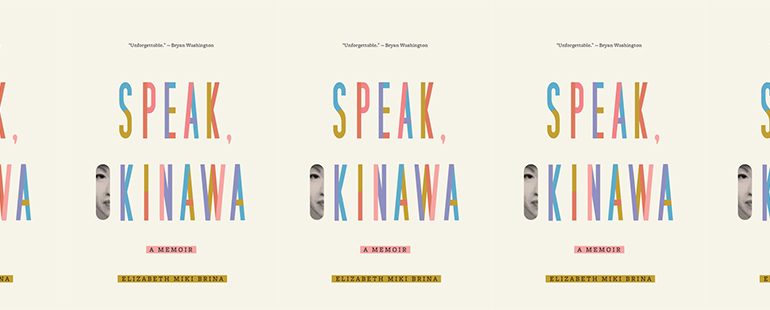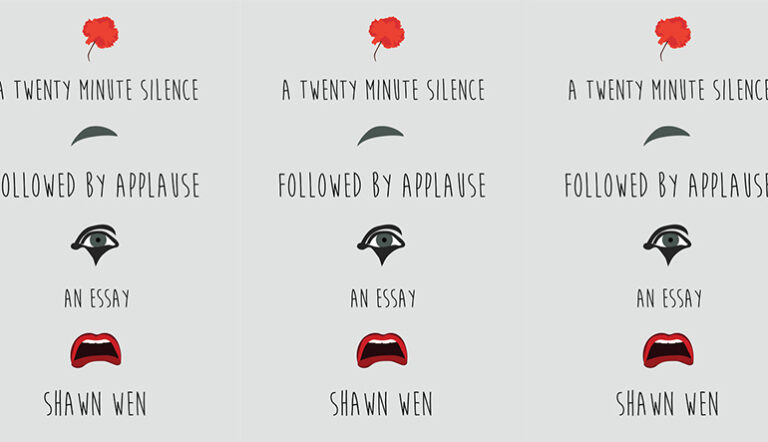The Stories Inherited in Speak, Okinawa

In Elizabeth Miki Brina’s debut memoir, Speak, Okinawa, she tackles the stories, the histories, and the inheritances she received from her Okinawan mother and American father. Brina invokes many settings in the book—the northeastern United States, where she lived as part of the one percent “other” in a 99% white town; Oakland; New Orleans; and Okinawa, which she visited with her mother multiple times in order to tell her story. But Brina understands that a good memoir doesn’t just contain the places and events of a single person’s life, that a person’s story doesn’t start with their birth. So Brina traces the stories of her mother and father and also delves into the relationships between their homes to examine her inheritances and figure out how they’ve manifested within her. Brina understands that those stories, the real ones—not the ones made up, glossing over trauma; not the Americanized history of Okinawa—are her inheritance.
Early in the memoir, Brina talks about the kind of stories—memories from your families, from your peoples—that “stay in our bodies. As sickness, as addiction, as poor posture or a tendency toward apology, as a deepened capacity for sadness or anger. As determination to survive, a relentless tempered optimism. I believe they are inherited, passed on to us like brown eyes or the shape of a nose.” This talk of inheritance being something more than what can physically be seen is key. Inherited trauma is a topic that has recently gotten increased attention, by scholars, in literature, and even in pop culture. Inherited trauma is the idea that someone can suffer the effects of trauma that happened to the people in their family, even trauma that happened before they were born. Inherited trauma helps explain PTSD, and signifies the mental and emotional struggles experienced by your mother, your father, your family, your peoples, your country, as well as how those cultural events and mannerisms and victories and losses have manifested inside or been weaved into the fabric of your being. The idea of inherited sin, too—that the sins of the father, the mother, the people in your family before you can be passed along as well—is as radical as it is important.
These inheritances are why Brina talks about how she wasn’t complete until she fully learned the history of her mother, of Okinawa, writing “I had not learned this history, my mother’s history, my history, until I was thirty-four years old. Which is to say that I grew up not knowing my mother or myself.” Alongside exploring this trauma, Brina’s ability to write about her father, about the American-ness that has seeped in, is equally brave. After listing some of his more problematic beliefs, she writes, “I cringe to admit that’s what he believes, but that’s what he believes. Writing it feels like betrayal, because he is my father and he means so much more to me than his bigotry.” But she has to write it to fully explore the story, to fully tell the story, to fully explore herself.
Early on in this process of excavation, the biggest obstacle of learning stories from her mother for Brina came in the form of a language barrier. Her mother’s native language, her most comfortable tongue, is and will always be Japanese, spoken with an Okinawan accent. But Brina doesn’t speak Japanese natively and talks about her struggle to communicate with her mother, to access thoughts and stories that her mother only has in Japanese, a door that is locked for Brina. She writes that “the cruelest injustice” her mother may face “is the fact that she can’t communicate with her daughter in her native language. The Japanese I don’t understand and speak measures the enormity of her inner world that is impenetrable, blocked, hidden from me.” History, colonialism, fills in the gaps of the story here. Not being granted the language to navigate and understand these stories makes it difficult for people like Brina to retrace their lineage and understand what is engrained in their body, in their being.
When telling the history of Okinawa, of the people that her family grew up a part of, Brina talks about a member of the community who abused women. As a memoirist, Brina writes about such moments using the first person plural “we” in order to bring the reader closer to the story. Brina talks about how family members on her mother’s side watched these bad events “because we want to bear witness. We watch because bearing witness is the only power left within us.” Bearing witness is important. It is all that can be done sometimes. Brina uses the present tense as she writes of the past and adds herself into the “we” of these stories—not to co-opt a struggle or experience, but to help herself bear witness. To give her access. The “we” brings both the reader and Brina closer to her peoples’ history. It lets her experience the stories, to witness, and to keep the witnessing going so the story gets told, so the story lives on. But still, Brina recognizes the disconnect between her and her mother when she writes how her “mother before me is a story. A story she can’t tell me in her own language. A story, she claims, she barely remembers. Or maybe she doesn’t want to remember. Or maybe she can’t remember because she was never taught how to remember. Because she was never told her life is important enough to remember. I am trying to tell her now that her life is important enough to remember.” This belief helps push Brina to write these moments in the present tense, in the moment, so she can do her best to relive the experience, understand the experience, and build off of it.
Brina, though, doesn’t just deal with the inheritances of the colonized—she deals with the inheritances of the colonizers. She doesn’t just deal with what she inherited from her Okinawan mother, but also from what she inherited from her American father. Brina writes, “I believe we inherit sin as much as we inherit trauma. I believe inherited sin is its own form of trauma. But maybe we have a chance at redemption. By being aware, being honest. By giving up power. By letting the world change. By changing ourselves. By apologizing. By forgiving? What would atonement and forgiveness look like? Within a person, a family, a nation?” These questions guide her exploration of her father’s family, of her father’s country, the one she was born into, the one that’s hers too. The sins are not fully her father’s, belonging also to the country that has significantly contributed to the physical and existential erasure of Okinawa—through bombs dropped, bases built, histories rewritten. By learning these histories of her father, of this country, she can process and understand that part of her too. But these stories are not easy for her to learn, for this country doesn’t process the pain it’s clearly caused, and her father struggles with the personal trauma he endured for his country.
While the difficulty surrounding communication with her mother about her story is an issue of language, of not having access to the vocabulary and culture that would prevent the devastating losses of translation, the difficulty surrounding communication with her father’s history stems from the losses of heroes her father held, as well as his very concept of heroism. Her father remembers his friends who died in the Vietnam War. She recounts, “He tells me that many friends who died, who were killed, approached him in dreams to let him know they were okay . . . He tells me that his friends mostly just wanted to talk, to rehash memories, but sometimes they wanted him to fight with them.” These dreams show how he still feels indebted to his friends, to the people he fought with, who he dreamed and wished to be heroes with. But as time passes, the conversation becomes one-sided. Even in his dreams, Brina’s father knows and understands how one-sided it is. And when the dreams stop, he says he misses them, and that even a one-sided conversation with his own ghosts was better than their absence.
Brina has to reach out to her father in different ways, for he tries to be the hero to this wife and daughter at all times, but he also isolates himself, which leaves him with nothing but the silence of ghosts passed, and this leaves him alone in a dark place, susceptible to the conspiracy theories and bigotry she mentions earlier in the book. This isolation, these theories, are how her father deals with the erasure of his heroes—the ones who’ve died and the ones whose stories have been diluted from the world. This is how he deals with a heroism he so believed in, but which ended up an empty promise.
The silence from his ghosts eats at him. You can’t be or feel like a hero when all your heroes, your friends, your brothers in arms, have been killed. The silence feeds into the isolation that leads to conspiracy theories and problematic thinking that isn’t congruent with Brina’s inherited trauma from her Okinawan side, that isn’t congruent with the wife and their daughter that he loves. But for Brina to explore her Okinawan side, she must explore how her upbringing, how her speaking English and living in the United States, has exacerbated her inherited trauma. How the silence of her father’s ghosts has affected him, and her. She has to investigate how those ghosts haunted him, and what they told him when he could still see and hear them. Brina is an American. And she has America, just like her father, woven into the fabric of her being. To examine and deconstruct that side of her story, she has to coax out and understand the ghosts that haunt her father so she can coax out and understand the ghosts that haunt her, ghosts that she hadn’t fully seen before.
In Speak, Okinawa, Brina takes on the difficult and necessary job of tracking down the histories of both of her parents, tracing their journeys to the present from different countries, continents, cultures. She has to navigate what is lost in translation and what has been lost physically on this earth in order to fully understand herself. In the memoir’s acknowledgments, Brina thanks her mother and father “for trusting me and allowing me to share your stories. I know my rendition of you will always be inadequate and incomplete. Words cannot express everything you are and everything you mean to me.” Brina also writes, “I am an Okinawan story. I am an American story.” Brina has been entrusted with these inheritances, has been allowed to join the “we” in telling them, and has been able to listen to and talk to the ghosts of her mother, her father, and of the countries that they and she come from.
Brina writes about the last Okinawan king being exiled to Tokyo, and how while he was being removed by Japanese soldiers he turned to his people and said, “Nuchi du takara.” Life is precious. That was a better last word than any declaration of revenge against their colonizer. Brina includes this inheritance near the end of her memoir, near the end of the recording of this story that holds her mother and father dearly, that holds her cherished “we,” that lets her Okinawa speak. These stories have been inherited, these ghosts have been listened to. And these lives are all precious.

